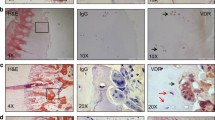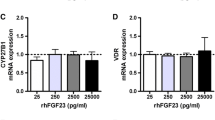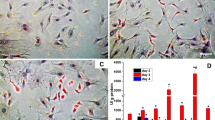Abstract
Some epidemiological studies suggested caffeine consumption as the cause for bone mineral density loss. Certain genes involved in this process are regulated by vitamin D receptor (VDR). Therefore, we investigated if caffeine can affect inducible expression of VDR-regulated genes, some of them being involved in bone mineralization process. By employing reporter gene assay, polymerase chain reaction, and western blotting, we monitored the VDR activity and expression in cell cultures of intestinal (LS180), osteosarcoma (HOS), and normal human osteoblasts in vitro. While caffeine stimulated calcitriol-inducible VDR-dependent nanoluciferase activity in stable reporter cell line IZ-VDRE (derived from LS180), it rather modulated mRNA levels of target genes, like CYP24A1, BGLAP, SPP1, and TNSF11 in LS180 and HOS cells. However, caffeine significantly decreased calcitriol-inducible CYP24A1, TNSF11, and SPP1 transcripts in osteoblasts. This decrease had non-linear U-shaped profile. Our in vitro data demonstrate biphasic action of caffeine on the expression of certain calcitriol-inducible VDR-regulated genes in normal human osteoblasts.


Similar content being viewed by others
References
Fulgoni VL 3rd, Keast DR, Lieberman HR (2015) Trends in intake and sources of caffeine in the diets of US adults: 2001-2010. Am J Clin Nutr 101(5):1081–1087
Teekachunhatean S, Tosri N, Rojanasthien N, Srichairatanakool S, Sangdee C (2013) Pharmacokinetics of caffeine following a single administration of coffee enema versus oral coffee consumption in healthy male subjects. ISRN Pharmacol 2013:147238
Chiang WF, Liao MT, Cheng CJ, Lin SH (2014) Rhabdomyolysis induced by excessive coffee drinking. Hum Exp Toxicol 33(8):878–881
Jones AW (2017) Review of caffeine-related fatalities along with postmortem blood concentrations in 51 poisoning deaths. J Anal Toxicol 41(3):167–172
Benowitz NL (1990) Clinical pharmacology of caffeine. Annu Rev Med 41:277–288
Mediero A, Cronstein BN (2013) Adenosine and bone metabolism. Trends Endocrinol Metab: TEM 24(6):290–300
Doepker C, Lieberman HR, Smith AP, Peck JD, El-Sohemy A, Welsh BT (2016) Caffeine: friend or foe? Annu Rev Food Sci Technol 7:117–137
Hansen SA, Folsom AR, Kushi LH, Sellers TA (2000) Association of fractures with caffeine and alcohol in postmenopausal women: the Iowa Women’s Health Study. Public Health Nutr 3(3):253–261
Hallstrom H, Wolk A, Glynn A, Michaelsson K (2006) Coffee, tea and caffeine consumption in relation to osteoporotic fracture risk in a cohort of Swedish women. Osteoporos Int 17(7):1055–1064
Harter DL, Busnello FM, Dibi RP, Stein AT, Kato SK, Vanin CM (2013) Association between low bone mass and calcium and caffeine intake among perimenopausal women in Southern Brazil: cross-sectional study. Sao Paulo Med J = Rev Paul de Med 131(5):315–322
Grainge MJ, Coupland CA, Cliffe SJ, Chilvers CE, Hosking DJ (1998) Cigarette smoking, alcohol and caffeine consumption, and bone mineral density in postmenopausal women. The Nottingham EPIC Study Group. Osteoporos Int 8(4):355–363
Kerner SA, Scott RA, Pike JW (1989) Sequence elements in the human osteocalcin gene confer basal activation and inducible response to hormonal vitamin D3. Proc Natl Acad Sci USA 86(12):4455–4459
Mosavin R, Mellon WS (1996) Posttranscriptional regulation of osteocalcin mRNA in clonal osteoblast cells by 1,25-dihydroxyvitamin D3. Arch Biochem Biophys 332(1):142–152
Neve A, Corrado A, Cantatore FP (2013) Osteocalcin: skeletal and extra-skeletal effects. J Cell Physiol 228(6):1149–1153
Anderson DM, Maraskovsky E, Billingsley WL, Dougall WC, Tometsko ME, Roux ER et al (1997) A homologue of the TNF receptor and its ligand enhance T-cell growth and dendritic-cell function. Nature 390(6656):175–179
Yasuda H, Shima N, Nakagawa N, Yamaguchi K, Kinosaki M, Mochizuki S et al (1998) Osteoclast differentiation factor is a ligand for osteoprotegerin/osteoclastogenesis-inhibitory factor and is identical to TRANCE/RANKL. Proc Natl Acad Sci USA 95(7):3597–3602
Rapuri PB, Gallagher JC, Kinyamu HK, Ryschon KL (2001) Caffeine intake increases the rate of bone loss in elderly women and interacts with vitamin D receptor genotypes. Am J Clin Nutr 74(5):694–700
Rapuri PB, Gallagher JC, Nawaz Z (2007) Caffeine decreases vitamin D receptor protein expression and 1,25(OH)2D3 stimulated alkaline phosphatase activity in human osteoblast cells. J Steroid Biochem Mol Biol 103(3–5):368–371
Zenata O, Vrzal R (2017) Fine tuning of vitamin D receptor (VDR) activity by post-transcriptional and post-translational modifications. Oncotarget 8(21):35390–35402
Bartonkova I, Grycova A, Dvorak Z (2016) Profiling of vitamin D metabolic intermediates toward VDR using novel stable gene reporter cell lines IZ-VDRE and IZ-CYP24. Chem Res Toxicol 29(7):1211–1222
Zenata O, Dvorak Z, Vrzal R (2018) Mycophenolate Mofetil induces c-Jun-N-terminal kinase expression in 22Rv1 cells: an impact on androgen receptor signaling. J Cancer 9(11):1915–1924
Doricakova A, Theile D, Weiss J, Vrzal R (2017) Differential effects of the enantiomers of tamsulosin and tolterodine on P-glycoprotein and cytochrome P450 3A4. Naunyn-Schmiedeberg’s Arch Pharmacol 390(1):49–59
Kong YY, Yoshida H, Sarosi I, Tan HL, Timms E, Capparelli C et al (1999) OPGL is a key regulator of osteoclastogenesis, lymphocyte development and lymph-node organogenesis. Nature 397(6717):315–323
Su SJ, Chang KL, Su SH, Yeh YT, Shyu HW, Chen KM (2013) Caffeine regulates osteogenic differentiation and mineralization of primary adipose-derived stem cells and a bone marrow stromal cell line. Int J Food Sci Nutr 64(4):429–436
Clemente N, Raineri D, Cappellano G, Boggio E, Favero F, Soluri MF et al (2016) Osteopontin bridging innate and adaptive immunity in autoimmune diseases. J Immunol Res 2016:7675437
Ferrari S, Rizzoli R, Manen D, Slosman D, Bonjour JP (1998) Vitamin D receptor gene start codon polymorphisms (FokI) and bone mineral density: interaction with age, dietary calcium, and 3’-end region polymorphisms. J Bone Miner Research: Off J Am Soc Bone Miner Res 13(6):925–930
Garnero P, Munoz F, Borel O, Sornay-Rendu E, Delmas PD (2005) Vitamin D receptor gene polymorphisms are associated with the risk of fractures in postmenopausal women, independently of bone mineral density. J Clin Endocrinol Metab 90(8):4829–4835
Fang Y, van Meurs JB, d’Alesio A, Jhamai M, Zhao H, Rivadeneira F et al (2005) Promoter and 3’-untranslated-region haplotypes in the vitamin d receptor gene predispose to osteoporotic fracture: the rotterdam study. Am J Hum Genet 77(5):807–823
Jurutka PW, Remus LS, Whitfield GK, Thompson PD, Hsieh JC, Zitzer H et al (2000) The polymorphic N terminus in human vitamin D receptor isoforms influences transcriptional activity by modulating interaction with transcription factor IIB. Mol Endocrinol 14(3):401–420
Nawrot P, Jordan S, Eastwood J, Rotstein J, Hugenholtz A, Feeley M (2003) Effects of caffeine on human health. Food Addit Contam 20(1):1–30
Harris SS, Dawson-Hughes B (1994) Caffeine and bone loss in healthy postmenopausal women. Am J Clin Nutr 60(4):573–578
Acknowledgements
This work was supported by the grant from Palacký University in Olomouc, PrF-2019-003.
Author information
Authors and Affiliations
Corresponding author
Ethics declarations
Conflict of interest
Ondrej Zenata, Adela Marcalikova, and Radim Vrzal declare that they have no conflict of interest.
Human and Animal Rights and Informed Consent
This article does not contain any studies with human subjects performed by any of the authors.
Additional information
Publisher's Note
Springer Nature remains neutral with regard to jurisdictional claims in published maps and institutional affiliations.
Rights and permissions
About this article
Cite this article
Ženata, O., Marcalíková, A. & Vrzal, R. The Effect of Caffeine on Calcitriol-Inducible Vitamin D Receptor-Controlled Gene Expression in Intestinal and Osteoblastic Cells. Calcif Tissue Int 105, 651–659 (2019). https://doi.org/10.1007/s00223-019-00602-4
Received:
Accepted:
Published:
Issue Date:
DOI: https://doi.org/10.1007/s00223-019-00602-4




